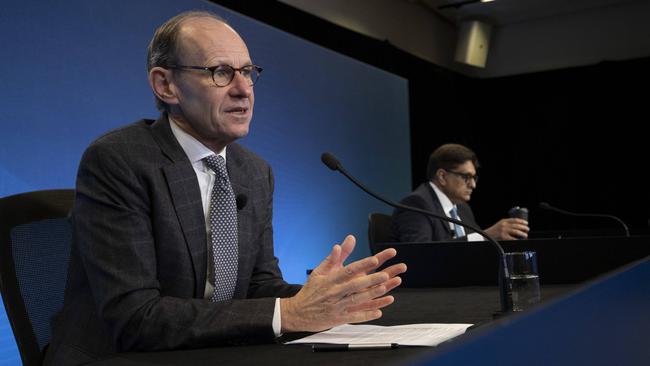Bonus doubt: ANZ chief executive Shayne Elliott may have to hand back millions
APRA will be monitoring the bank board’s actions as ASIC investigates potential market manipulation, with CEO Shayne Elliott and institutional boss Mark Whelan facing a big bonus hit.

Business
Don't miss out on the headlines from Business. Followed categories will be added to My News.
ANZ chief executive Shayne Elliott is facing a potential multimillion-dollar hit to his pay and the prospect of handing back bonuses as he grapples with a major bond trading scandal.
But top executives are unlikely to face fines under the new financial accountability regime (FAR) even if ANZ is found to have broken the law, legal experts say.
As the big four bank battles an escalating crisis over allegations its traders manipulated the market in a $14bn government bond sale in April 2023, the prudential regulator will monitor the board’s actions in coming months, including executive pay, as the corporate cop’s investigation continues, potentially into next year.
Mr Elliott, in the top job at ANZ since 2016, took home $4.6m in 2023, including $2m in bonuses after the board determined his performance for the year came in “well above target”. On top of this, he was awarded long-term potential bonus shares worth a further $3.4m.
But new rules on executive remuneration, including clawback provisions, could put Mr Elliott on the hook to hand back the 2023 bonus, while the $3.4m in share rights may also disappear, along with any hope of a bonus this year, if the ASIC investigation goes against the bank.
In its scrutiny of ANZ, the Australian Prudential Regulatory Authority will be obliged to weigh up the FAR as well as a relatively new prudential standard, CPS 511, that requires entities to dock pay for poor risk outcomes.
“The biggest test in all of this is around APRA’s enforcement and investigation powers. They need to be looking at this,” said Vas Kolesnikoff, head of research at proxy firm Institutional Shareholder Services.
“(Prudential standard) CPS 511 puts pressure on APRA and the board. So now it’s an APRA enforcement issue … the board has to (act). They can’t just weasel out of this anymore.”
CPS 511, in force for the major banks since 2023 and the rest of the industry from this year, requires that APRA-regulated entities put in place remuneration arrangements that “appropriately incentivise individuals to prudently manage the risks they are responsible for, and that there are appropriate consequences for poor risk outcomes”.
“It’s the law that the directors now have to reduce bonuses to as low as zero in the event of material performance failures – and these failures include conduct and risk management,” Mr Kolesnikoff said.

The standard also introduced clawback provisions, with executive bonuses in the form of cash or shares now at risk for at least two years after being paid out.
APRA declined to comment.
Mr Elliott is not the only executive bracing for a major cut to pay. Institutional boss Mark Whelan, the second-highest paid executive at ANZ, is also facing a potential bonus hit and clawbacks. He took home $3m last year, half in bonuses.
The ANZ board has already flagged potential action against the bank’s leadership team, with Mr Elliott saying it would “lead a process to ensure consequences will be applied to senior executives, both past and present, including myself, where appropriate”.
Shareholders will vote on the executive remuneration report in December when there may be a clearer picture of the ASIC investigation. But at the very least, the bank supplied inflated bond turnover data to the AOFM, helping it win more mandates, and its oversight of conduct in its trading division was sloppy, with several traders now fired or suspended following inappropriate behaviour.
For Mr Elliott, Mr Whelan and a handful of others, the biggest threat posed by the FAR is the prospect of being disqualified from working in the industry.
But there is little risk of civil penalties under the accountability regime, which replaced the Banking Executive Accountability Regime (BEAR) this year. The system is co-administered by APRA and ASIC.
Indeed, the FAR Act does not impose any civil penalties on top executives, though bankers may still face ancillary civil penalties in limited circumstances, according to UNSW corporate law professor Pamela Hanrahan.
“If (a corporate officer) is involved in a contravention by the bank of its accountable entity responsibilities, they can be penalised for that involvement, but not for breaching their accountable person obligations,” UNSW corporate law professor Pamela Hanrahan said.
There was a much higher threshold in proving a corporate officer was involved in a bank breaching its accountable entity responsibilities, Professor Hanrahan, who is also a former ASIC regional commissioner, said.
“You would have to prove that the (corporate officer) knew there was something wrong and that they took active steps to make that wrong thing happen.”
While individual fines under the FAR are unlikely, negligence by directors and top executives can still attract civil penalties of up to $1.5m under the Corporations Act.
Meanwhile the trading scandal is still dealing fresh blows: the bank is now under pressure from state governments over its role in bond trades over the past year and New Zealand’s financial authority is reportedly looking into complaints alleging potential market manipulation of government bond markets.
The Victorian government is the latest to weigh in, with a spokesman saying the Treasury Corporation of Victoria “is monitoring the situation and ASIC’s investigation”.
It comes after the South Australian government ordered ANZ to conduct a review of trades in its bonds over the past financial year and ANZ’s business with the Queensland government was put on hold.
With the crisis set to drag on, the bank last week finalised its $4.9bn Suncorp Bank acquisition. Mr Elliott hailed it “an exciting day” for ANZ.
“This strategically important acquisition boosts our presence in Queensland, adds scale to our retail and commercial businesses, and means we can compete more effectively across the Australian market,” Mr Elliott said.
More Coverage
Originally published as Bonus doubt: ANZ chief executive Shayne Elliott may have to hand back millions




